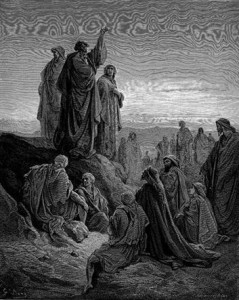Exodus 1:8-2:10
This text is used as the Lectionary Text for Year A on August 27, 2017.
 The subject of the sovereignty of God can be a touchy one within the church. It raises seemingly limitless questions, with seemingly limitless answers depending on one’s subscription to any number of theologies. The nature and scope of God’s sovereignty are often disagreed upon—even to the point of contention—among Christian denominations. But the fact that God is sovereign, whatever that might look like, is a critical tenet for all who profess, “Jesus is Lord.”
The subject of the sovereignty of God can be a touchy one within the church. It raises seemingly limitless questions, with seemingly limitless answers depending on one’s subscription to any number of theologies. The nature and scope of God’s sovereignty are often disagreed upon—even to the point of contention—among Christian denominations. But the fact that God is sovereign, whatever that might look like, is a critical tenet for all who profess, “Jesus is Lord.”
The passage begins by highlighting humanity’s ephemeral nature. Not even a great man like Joseph, who had risen to a place of prominence in Egypt, can be remembered forever. What has withstood the test of time, however, are the people through whom God’s covenant with Abraham would be fulfilled. The Israelites have honored God’s creation mandate to “be fruitful and multiply” (Genesis 1:28), and their growing number was a sign of God’s presence and blessing. The size of the Israelite population has snuck up on Pharaoh, and he decides to put an end to their growth—he attempts, in effect, to put an end to God’s presence and blessing among God’s people. Pharaoh does not deport the Israelites from his land; he recognizes that they have value to him, and he attempts to exploit it by ruthlessly imposing slave labor upon them. God’s sovereignty shines through, however, as the Israelites respond to Pharaoh’s oppression by further increasing in number. The Egyptians began to loathe the Israelites—after all, as the plagues in Exodus 8 would reveal, Egyptians hate swarms.



